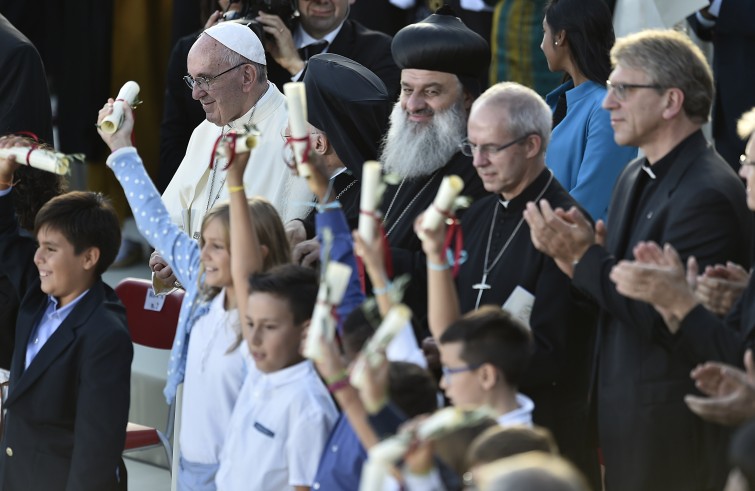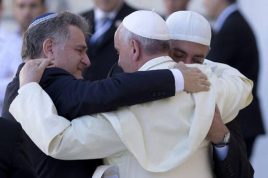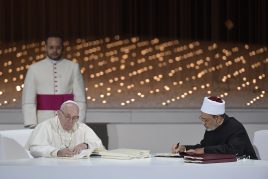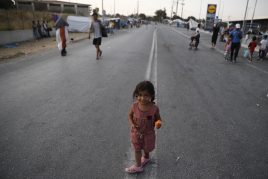
 “Confronted with the major challenge humanity is facing, we must provide an equally powerful, if not greater response of goodness. We must respond to the evil caused by social injustice with what is Good. The Pope has understood this and is proposing a covenant of human brotherhood.” Shahrzad Houshmand Zadeh, Muslim theologian, lecturer at the Faculty of Oriental Studies at La Sapienza University, thus commented on the third Encyclical of Pope Francis “Brothers All” on fraternity and social friendship. The Pope will sign the Encyclical in Assisi on the afternoon of October 3. Professor Houshmand continues: “As Civiltà Cattolica wrote, we are facing an apocalypse in a different guise today. Let it suffice to mention the vessels loaded with human lives seeking a safe haven in a land where they can survive or simply not die. Or still, the pictures of minors aboard inflatable dinghies whose mothers bid them farewell, headed towards an unknown and uncertain fate. Not to mention new and old conflicts that sow death in many parts of the world.
“Confronted with the major challenge humanity is facing, we must provide an equally powerful, if not greater response of goodness. We must respond to the evil caused by social injustice with what is Good. The Pope has understood this and is proposing a covenant of human brotherhood.” Shahrzad Houshmand Zadeh, Muslim theologian, lecturer at the Faculty of Oriental Studies at La Sapienza University, thus commented on the third Encyclical of Pope Francis “Brothers All” on fraternity and social friendship. The Pope will sign the Encyclical in Assisi on the afternoon of October 3. Professor Houshmand continues: “As Civiltà Cattolica wrote, we are facing an apocalypse in a different guise today. Let it suffice to mention the vessels loaded with human lives seeking a safe haven in a land where they can survive or simply not die. Or still, the pictures of minors aboard inflatable dinghies whose mothers bid them farewell, headed towards an unknown and uncertain fate. Not to mention new and old conflicts that sow death in many parts of the world.
We are facing a serious global crisis worsened by the pandemic, which spread a wave of sadness and fear.”
How can the covenant of brotherhood that the Pope proposes be translated into concrete action?
The message is only apparently new, as it its roots date back to our ancient history, to the sacred texts and documents of our respective religions. But it is a forgotten message. With this Encyclical, Francis invites us to wake up, to open our eyes, to return to the innermost essence of our religions and our spirituality. Without brotherhood, the spiritual and religious message inherent in Christianity and Islam is not fulfilled.
Without brotherhood, our religions risk being nothing more than empty words, unfulfilled, not incarnated in concrete life.
 Why have we lost or forgotten this ability to see each other as brothers?
Why have we lost or forgotten this ability to see each other as brothers?
Because we were afraid. Fear is at the root of evil.
When we are afraid, we seek shelter in closed spaces, we raise walls. We conceal ourselves behind ” headings”, and those “headings” create nationalisms, ideologies, political parties and our fellow other is turned into our enemy. That of Pope Francis is a wake-up call: he is inviting us to tear down those walls, overcome fear, look into the eye of the other person and realize that the other person is weeping just like us, and that their tears are the same shade as ours.
 To what extent has the encounter of Pope Francis with Islam influenced the drafting of this Encyclical?
To what extent has the encounter of Pope Francis with Islam influenced the drafting of this Encyclical?
It reminds me of the meeting of Francis of Assisi with the Sultan. The historical circumstances are likewise similar. Back then there were the Crusades. Today other forms of crusades and jihadisms are taking place. We are experiencing a similar if not worse situation worldwide because the new technologies have provided humankind with much more powerful and destructive weapons. The iconographic depictions of the meeting of St. Francis of Assisi and the Sultan are impressive: two faces that look into each other’s eyes and embrace each other. Pope Francis is virtually replicating that encounter in a new form.
 That new form took shape in the Abu Dhabi document.
That new form took shape in the Abu Dhabi document.
Never before had a Pope travelled to the Arab Emirates, never before did a Pope put himself on the same level and around the same table to dialogue and reflect together with the whole of humanity. The Abu Dhabi Document is bound to brighten our future. Although it may still not have been fully processed and transmitted, it is a revolutionary text that is true to the founding pillars of both religions. The document identifies the spirituality of service as key to human fraternity. If a religion does not translate into concrete service to the neighbour, it severs its very roots. It is a challenge to our current historical circumstances.
 In the past few days it has been noted that the title of the Encyclical should have been ” Brothers and Sisters All” in relation to equality. What is your opinion?
In the past few days it has been noted that the title of the Encyclical should have been ” Brothers and Sisters All” in relation to equality. What is your opinion?
In the Persian language, which is my mother tongue, when we say “brothers”, we mean only the male gender, so in this case, the term “sisters” should be added. In other languages, such as Italian but also Arabic, the term ” brothers” may encompass the female gender. However, if this argument is to be pursued, I believe that the same criticism should extend to terms related, for example, to the professions of doctor, minister, lawyer, finding a way to express them in the female gender.
However, this is not the time for this kind of linguistic critique of a document that proposes a lofty human and spiritual covenant.
On the subject of women, is there a specific way in which women live out the spirit of fraternity?
In my opinion, women have a special and extraordinary ability to show mercy, forgiveness and acceptance. I believe that this Document is addressed to everyone, men and women alike, but women are enlightened in a specific way. By nature, women welcome diversity within themselves, and acknowledge it as their child with outpouring love. Most importantly, women tend to be more sensitive to the smallest and neediest.












